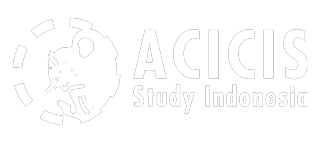By Michael Costa (Semester 26/Feb 2008)
Deakin University
I am currently undertaking my final year of a Bachelor of Commerce/Bachelor of Arts, majoring in Economics and Indonesian at Deakin University. My application for ACICIS in 2007, specifically the Islamic Business Option at UII, was to further develop my understanding of the Indonesian Economy, and how Muslim values and laws affect the business approaches implemented in Indonesia.
I undertook Islamic units in philosophy, teachings and business to get my head around what it meant to be a Muslim. I gained a greater appreciation for the Quran, which is similar in teachings to that of the bible and then learnt about Hadiths, teachings and phrases of the prophet Muhammad. I had some great conversations with UII students, discussing the finer points of religion, politics, terrorism and more importantly student life and how Indonesian Muslims like to have a good time. I felt comfortable, accepted and appreciated for taking the time to want to learn more about Indonesia as an Islamic nation, and I actually found them to be very liberal and progressive in their opinions.
Apart from the religious side which seemed to impact most aspects of life in Indonesia from politics to business to social norms, I was also interested in the economics of doing business in a developing country. This is why I undertook Environmental Economics to comprehend the inefficient management of natural resources, methods to analyse resource management, together with programs that could be implemented to overcome such inefficiencies.
For me, however, the main purpose of the Islamic Business Option was to undertake the internship unit. Together with further understanding the economy of a developing nation, I was also seeking to understand how Western economies differ to Islamic economies, and if in fact there is something that each can learn from one another. As a student of economics and Indonesian, it seemed a natural progression to want to study in the country I had been learning so much about. The assessment was also very similar to the requirements at my home university, so the hassle of gaining full credit for the unit wasn’t an issue.
Having undertaken an internship at Borobudur Silver in January 2007, I was expecting to be placed in a well-established business and given daily tasks to complete, much I like an apprenticeship. I would learn about the business processes as well as the local and international market it operated in. I would then be required to write a short report on my observations and activities. It was, however, very different. A combination of an apprenticeship where I gained an understanding of Islamic business ethics, Javanese values and the need for community development, I also had the opportunity to create programs, partnerships and aid the business development. It was real hands on stuff and gave my Indonesian language a real workout.
I worked in a kampung for Pensil Terbang, predominantly a candle manufacture and exporter; it also played an active role in the local community. Motivated by more than profit and loss statements, it was a type of Corporate Social Responsibility (CSR) on a local level that saw the development of community-based projects.
In all honesty, the internship was all a bit daunting initially. Trying to decide upon an issue that needed developing, or a problem that needed to be solved, there were just so many different angles you could address in the business. Being time conscious was also difficult; trying to be realistic about the programs that could be developed in the time allocated was not easy. But when it came to the implementation, everything became more familiar as I started to see results of my work. I was offered an English interpreter at the commencement of the internship, but declined the offer, as language development was also an objective. This did make the internship a little more difficult, but a lot more rewarding. Academically, the report was what I found most challenging. Developing the link between theory and practice needed more time for reflection, but guidance from lecturers and mentors, helped set me in the right direction.
Throughout my four years of undergraduate study, nothing can compare to the valuable insight and practical experiences had in an in-country exchange program. It has certainly added meaning to my studies, and given me a better idea of what to expect when doing business in Indonesia. I’ve created networks and relationships that I know will be of benefit in the future, and this experience is a step in the right direction for strengthening the relationship between Indonesia and Australia.
Put simply, it’s a must have experience if truly wanting to understand Indonesian business practices and gain hands on experience. It’s been a challenge, a lesson in diplomacy and cultural sensitivity, and by far one of the most rewarding experiences of my undergraduate degree.
